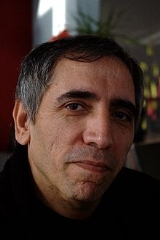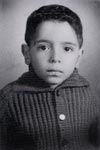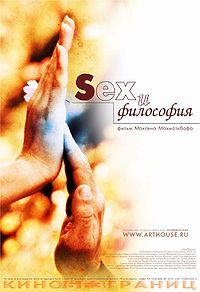
Mohsen Makhmalbaf
Encyclopedia
Mohsen Makhmalbaf is an Iran
ian film director
, writer
, editor, and producer
. During 2007 he was the president of Asian Film Academy.
Makhmalbaf's films have been widely presented in international film festivals in the past ten years. The multi-award-winning director, belongs to the new wave
movement of Iranian cinema. Time magazine selected Makhmalbaf's 2001 film, Kandahar, as one of top 100 films of all time. In 2006, he was a member of the Jury at the Venice film festival
.
Makhmalbaf left Iran in 2005 shortly after the election of Mahmoud Ahmadinejad and now lives in Paris. As of June 12, 2009, and following the events of the 2009 Iranian presidential election, Mohsen Makhmalbaf has claimed that he has been appointed the official spokesman of Mir-Hossein Moussavi's campaign abroad.
 Mohsen Makhmalbaf is a major figure in Iranian cinema. His films have explored the relationship between the individual and a larger social and political environment. As a result, his work serves as an extended commentary on the historical progression of the Iranian state and its people. Makhmalbaf focuses on several genres, from realist films to fantasy and surrealism, from minimalism to large frescos of everyday life, with a predilection (common to Iranian directors) for the themes of childhood and cinema.
Mohsen Makhmalbaf is a major figure in Iranian cinema. His films have explored the relationship between the individual and a larger social and political environment. As a result, his work serves as an extended commentary on the historical progression of the Iranian state and its people. Makhmalbaf focuses on several genres, from realist films to fantasy and surrealism, from minimalism to large frescos of everyday life, with a predilection (common to Iranian directors) for the themes of childhood and cinema.
In 1981 he wrote the screenplay for Towjeeh directed by Manuchehr Haghaniparast. In 1982 he wrote the screenplay for Marg Deegari directed by Mohamad Reza Honarmand. He made his first film Tobeh Nosuh in 1983. Boycott is a 1985 film by Mohsen Makhmalbaf, set in pre-revolutionary Iran. The movie tells the story of a young man named Valeh (Majid Majidi) who is sentenced to death for his communist tendencies. It is widely believed that the movie is based on Makhmalbaf’s own experiences. Mohsen Makhmalbaf creates a spare and deeply affecting portrait of human despair, exploitation, and resilience in The Cyclist (1987). The movie is about Nasim, a poor Afghan refugee in Iran
, who is in desperate need of money for his ailing wife. Finally Nasim agrees to ride a bicycle in a small circle for one week straight in return for the money he needs to pay his wife’s medical bills. Time of Love (1991) is Mohsen Makhmalbaf’s ninth feature film and the first film of what he calls his "third period". It is a romantic trilogy that offers three variations of the same story.
Makhmalbaf directed Gabbeh in 1996. The film follows the nomadic Ghashghai people, whose bright, bold carpets tell stories. The main yarn features a young woman who loves a mysterious stranger, but is forbidden to marry him. Makhmalbaf attempts to follow the carpet idea by making his film dreamily romantic and non-realistic. Events seem to leap around in time and space, much like a dream. Kandahar (2001) is a fictional odyssey inspired by a true story. It is Makhmalbaf's look at Afghanistan before Sept. 11, as the Taliban's laws strip women of civil rights and hope, and a Western-cultured Afghan woman returns to prevent her sister's suicide during the last eclipse of the 20th century.

Films banned in Iran
Film appearances
Iran
Iran , officially the Islamic Republic of Iran , is a country in Southern and Western Asia. The name "Iran" has been in use natively since the Sassanian era and came into use internationally in 1935, before which the country was known to the Western world as Persia...
ian film director
Film director
A film director is a person who directs the actors and film crew in filmmaking. They control a film's artistic and dramatic nathan roach, while guiding the technical crew and actors.-Responsibilities:...
, writer
Writer
A writer is a person who produces literature, such as novels, short stories, plays, screenplays, poetry, or other literary art. Skilled writers are able to use language to portray ideas and images....
, editor, and producer
Film producer
A film producer oversees and delivers a film project to all relevant parties while preserving the integrity, voice and vision of the film. They will also often take on some financial risk by using their own money, especially during the pre-production period, before a film is fully financed.The...
. During 2007 he was the president of Asian Film Academy.
Makhmalbaf's films have been widely presented in international film festivals in the past ten years. The multi-award-winning director, belongs to the new wave
Iranian New Wave (cinema)
Iranian New Wave refers to a new movement in Iranian cinema. It started in 1969 after the release of The Cow directed by Darius Mehrjui. It was followed by Masoud Kimiai's Qeysar, and Nasser Taqvai's Calm in Front of Others. They set off a trend that was cultural, dynamic and intellectual. The...
movement of Iranian cinema. Time magazine selected Makhmalbaf's 2001 film, Kandahar, as one of top 100 films of all time. In 2006, he was a member of the Jury at the Venice film festival
Venice Film Festival
The Venice International Film Festival is the oldest international film festival in the world. Founded by Count Giuseppe Volpi in 1932 as the "Esposizione Internazionale d'Arte Cinematografica", the festival has since taken place every year in late August or early September on the island of the...
.
Makhmalbaf left Iran in 2005 shortly after the election of Mahmoud Ahmadinejad and now lives in Paris. As of June 12, 2009, and following the events of the 2009 Iranian presidential election, Mohsen Makhmalbaf has claimed that he has been appointed the official spokesman of Mir-Hossein Moussavi's campaign abroad.
Career

In 1981 he wrote the screenplay for Towjeeh directed by Manuchehr Haghaniparast. In 1982 he wrote the screenplay for Marg Deegari directed by Mohamad Reza Honarmand. He made his first film Tobeh Nosuh in 1983. Boycott is a 1985 film by Mohsen Makhmalbaf, set in pre-revolutionary Iran. The movie tells the story of a young man named Valeh (Majid Majidi) who is sentenced to death for his communist tendencies. It is widely believed that the movie is based on Makhmalbaf’s own experiences. Mohsen Makhmalbaf creates a spare and deeply affecting portrait of human despair, exploitation, and resilience in The Cyclist (1987). The movie is about Nasim, a poor Afghan refugee in Iran
Afghans in Iran
Afghans in Iran are mostly refugees who fled Afghanistan during the 1980s Soviet war as well as diplomats, traders, businesspersons, workers, exchange students, tourists and other visitors. As of March 2009, nearly 1 million Afghan nationals were reported to be living in Iran...
, who is in desperate need of money for his ailing wife. Finally Nasim agrees to ride a bicycle in a small circle for one week straight in return for the money he needs to pay his wife’s medical bills. Time of Love (1991) is Mohsen Makhmalbaf’s ninth feature film and the first film of what he calls his "third period". It is a romantic trilogy that offers three variations of the same story.
Makhmalbaf directed Gabbeh in 1996. The film follows the nomadic Ghashghai people, whose bright, bold carpets tell stories. The main yarn features a young woman who loves a mysterious stranger, but is forbidden to marry him. Makhmalbaf attempts to follow the carpet idea by making his film dreamily romantic and non-realistic. Events seem to leap around in time and space, much like a dream. Kandahar (2001) is a fictional odyssey inspired by a true story. It is Makhmalbaf's look at Afghanistan before Sept. 11, as the Taliban's laws strip women of civil rights and hope, and a Western-cultured Afghan woman returns to prevent her sister's suicide during the last eclipse of the 20th century.
Filmography

- BoycottBoycott (film)Boycott is a 1985 Iranian film directed by Mohsen Makhmalbaf, set in pre-revolutionary Iran. The film tells the story of a young man named Valeh who is sentenced to death for his communist tendencies. It is widely believed that the film is based on Makhmalbaf's own experiences. The actor Ardalan...
(1985) - The Street Vendor (1986)
- The BicyclistThe Bicyclist-Plot:Nasim, a poor Afghan refugee in Iran, gives a demonstration in his town's square where he rides his bicycle without stopping for seven days and seven nights, with the aim of raising money for life-saving surgery for his dying wife. In the end, even after seven days, he continues to pedal...
(1987) - Dastforoush (a/k/a "The Peddler," US) (1987)
- The Marriage of the BlessedThe Marriage of the BlessedMarriage of the Blessed is a 1989 Iranian film directed by Mohsen Makhmalbaf about Haji, a young soldier of the Iran–Iraq War, and his inability to adapt to civilian life after his release from the hospital....
(1988) - Time of LoveTime of LoveTime of Love is a 1990 film by Iranian director Mohsen Makhmalbaf, based on a story written by Makhmalbaf himself. The film consists of three episodes, all with relatively similar plots. Although categorized as an Iranian film, Time of Love was mostly shot in Istanbul, Turkey and the dialogues are...
(1990) - The Nights of Zayande-rood (1990)
- Once Upon a Time, Cinema (1991)
- ActorActor (film)Actor , is a 1993 Iranian film directed by Mohsen Makhmalbaf. The film features Akbar Abdi as Akbar, Fatemeh Motamed-Aria as his wife, Simin, and Mahaya Petrosian as the gypsy girl...
(1993) - Hello CinemaHello CinemaHello Cinema is a 1994 Iranian film directed by Mohsen Makhmalbaf. It was screened in the Un Certain Regard section at the 1995 Cannes Film Festival. It was made explicitly for the celebration of the 100th anniversary of cinema. The year 1895 is considered the debut of the motion picture as an...
(1994) - GabbehGabbeh (film)Gabbeh is a 1996 Iranian film directed by Mohsen Makhmalbaf. It was screened in the Un Certain Regard section at the 1996 Cannes Film Festival. The film gets its name from a type of Persian rug and starts by showing an elderly couple, carrying their Gabbeh, walking toward the river hoping to wash...
* (1995) - Bread and Flower-pot (retitled A Moment of InnocenceA Moment of InnocenceA Moment of Innocence is a 1996 film directed by Mohsen Makhmalbaf. It is also known as Bread and Flower, Bread and Flower Pot, and The Bread and the Vase-Plot:...
for anglophone audiences) (1995) - The Silence (1997)
- Tales of KishTales of KishTales of Kish is a 1999 Iranian drama anthology film. It was entered into the 1999 Cannes Film Festival.-Cast:* Hossein Panahi as Shanbeh * Atefeh Razavi as Wife...
(1999) - Test of Democracy (1999), with Farrokh-yar
- Kandahar (2001), brought him the Federico FelliniFederico FelliniFederico Fellini, Cavaliere di Gran Croce OMRI , was an Italian film director and scriptwriter. Known for a distinct style that blends fantasy and baroque images, he is considered one of the most influential and widely revered filmmakers of the 20th century...
Prize From UnescoUNESCOThe United Nations Educational, Scientific and Cultural Organization is a specialized agency of the United Nations...
in ParisParisParis is the capital and largest city in France, situated on the river Seine, in northern France, at the heart of the Île-de-France region...
in 2001 - Alefbay-e afghan (2002) (The Afghan Alphabet, documentary)
- Monday Market (2004)
- Colder Than Fire (2005)
- Sex & PhilosophySex & PhilosophySex & Philosophy is a 2005 French-Iranian-Tajik film directed, written and produced by Mohsen Makhmalbaf. Starring Daler Nazarov, Mariam Gaibova, and Farzona Beknazarova the film is set in Tajikistan. Sex & Philosophy premiered at the Montreal World Film Festival in September 2005...
(2005) - Chair (2005)
- Poet of wastes (2005)
- Scream of the ants (2006)
- The Man Who Came With the Snow (2009), co-directed with Marzieh Meshkini
Films banned in Iran
- Time of LoveTime of LoveTime of Love is a 1990 film by Iranian director Mohsen Makhmalbaf, based on a story written by Makhmalbaf himself. The film consists of three episodes, all with relatively similar plots. Although categorized as an Iranian film, Time of Love was mostly shot in Istanbul, Turkey and the dialogues are...
(1990), banned since 1990 - The Nights of Zayande-rood (1990), banned since 1990
- Bread and Flower-pot (1995), banned from 1995 until 1997
- The Silence (1997), banned from 1997 until 2000
- Naser-ed-din Shah (1991), banned from 1992 until 1993
Film appearances
- The Marriage of the BlessedThe Marriage of the BlessedMarriage of the Blessed is a 1989 Iranian film directed by Mohsen Makhmalbaf about Haji, a young soldier of the Iran–Iraq War, and his inability to adapt to civilian life after his release from the hospital....
(1988), directed by himself - Close-upClose-up (film)Close-Up is a film directed by Iranian filmmaker Abbas Kiarostami, a docufiction. The film tells the story of the real-life trial of a man who impersonated film-maker Mohsen Makhmalbaf, conning a family into believing they would star in his new film. It features the people involved, acting as...
(1988), directed by Abbas KiarostamiAbbas KiarostamiAbbas Kiarostami is an internationally acclaimed Iranian film director, screenwriter, photographer and film producer. An active filmmaker since 1970, Kiarostami has been involved in over forty films, including shorts and documentaries... - Hello CinemaHello CinemaHello Cinema is a 1994 Iranian film directed by Mohsen Makhmalbaf. It was screened in the Un Certain Regard section at the 1995 Cannes Film Festival. It was made explicitly for the celebration of the 100th anniversary of cinema. The year 1895 is considered the debut of the motion picture as an...
(1994), directed by himself - Bread and Flower-pot (1995), directed by himself
- The Test of Democracy (1999), directed by himself and Farrokh-yar
Books on Makhmalbaf
- Hamid DabashiHamid DabashiHamid Dabashi born 1951 in Ahvaz is an Iranian-American Professor of Iranian Studies and Comparative Literature at Columbia University in New York City.He is the author of over twenty books...
, Close Up: Iranian Cinema, Past, Present and Future. (Chapter on Makhmalbaf). Verso, 2001. - Hamid DabashiHamid DabashiHamid Dabashi born 1951 in Ahvaz is an Iranian-American Professor of Iranian Studies and Comparative Literature at Columbia University in New York City.He is the author of over twenty books...
, Like Light from the Heart of Darkness. Sakuhinsha, Japan, 2004. - Hamid DabashiHamid DabashiHamid Dabashi born 1951 in Ahvaz is an Iranian-American Professor of Iranian Studies and Comparative Literature at Columbia University in New York City.He is the author of over twenty books...
, Masters & Masterpieces of Iranian Cinema: (Chapter XI: Mohsen Makhmalbaf: A Moment of Innocence. pp. 325–368). Mage Publishers, 2007. ISBN 093421185X. - Hamid DabashiHamid DabashiHamid Dabashi born 1951 in Ahvaz is an Iranian-American Professor of Iranian Studies and Comparative Literature at Columbia University in New York City.He is the author of over twenty books...
, Makhmalbaf at Large: The Making of a Rebel Filmmaker. I. B. Tauris, 2007. http://www.ibtauris.com/display.asp?K=9781845115326&aub=Hamid%20Dabashi&m=1&dc=2
Filmsabout Makhmalbaf
- The Closed Eyes of Mohsen
- Close upClose-up (film)Close-Up is a film directed by Iranian filmmaker Abbas Kiarostami, a docufiction. The film tells the story of the real-life trial of a man who impersonated film-maker Mohsen Makhmalbaf, conning a family into believing they would star in his new film. It features the people involved, acting as...
, by Abbas KiarostamiAbbas KiarostamiAbbas Kiarostami is an internationally acclaimed Iranian film director, screenwriter, photographer and film producer. An active filmmaker since 1970, Kiarostami has been involved in over forty films, including shorts and documentaries...
, 1990 - Friendly Persuasion: Iranian Cinema After the Revolution
- Cinema Is Nation's Language
- The Dumb Man's Dream
- Who's Who?
- Salam Cinema (German)"
- Cinema Is Nation's Language (Tadjik)"
External links
- Makhmalbaf Film House (Official Website of Makhmalbaf's family: Mohsen - Marzieh - Samira - Maysam - Hana)
- Mohsen Makhmalbaf at the Internet Movie DatabaseInternet Movie DatabaseInternet Movie Database is an online database of information related to movies, television shows, actors, production crew personnel, video games and fictional characters featured in visual entertainment media. It is one of the most popular online entertainment destinations, with over 100 million...
- Firouzan Films Iranian Movie Hall of Fame Inductee Mohsen Makhmalbaf
- Worlds Transformed: Iranian Cinema and Social Vision
- Mohsen Makhmalbaf: Retrospective by Donato Totaro (1997)

